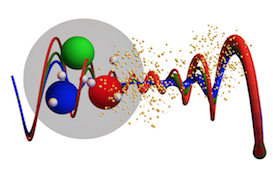Speaker
Description
The experimental observations of anisotropic flows in proton-proton and proton-nucleus collisions at RHIC and LHC energies has stimulated a big interest in these small systems due to the possible formation of short-lived droplets of quark-gluon plasma. We investigate the effects of nonequilibrium dynamics in relativistic proton-nucleus collisions by comparing a microscopic nonequilibrium transport approach, the Parton-Hadron-String-Dynamics (PHSD), with a macroscopic 2D+1 viscous hydrodynamical model, VISHNew. The initial conditions for the hydrodynamic evolution are extracted from PHSD at different times in order to study its impact on the subsequent medium evolution. We investigate the nonequilibrium dynamics by analysing quantities such as the energy density and the viscous corrections. We also discuss the role of the collective flows. The origin of the elliptic flow in high-multiplicity proton-nucleus collisions is still under debate; we address this issue by applying the event-shape engineering through the transverse spherocity observable, capable of classifying different final-state event topologies. Moreover, we discuss the development of the directed flow and in particular of its splitting, focusing on the connection with the baryon transport to midrapidity and the electromagnetic fields. The investigation of such anisotropic flow coefficients may allow to gain further insights into the mechanisms responsible for the QGP-like effects in small systems as well as to the transport properties of the produced medium, such as the electric conductivity which drives the evolution of the electromagnetic fields.
[1] L. Oliva, W. Fan, P. Moreau, S.A. Bass and E. Bratkovskaya, Phys. Rev. C 106, 044910 (2022)
[2] L. Oliva, P. Moreau, V. Voronyuk and E. Bratkovskaya, Phys. Rev. C 101, 014917 (2020)

